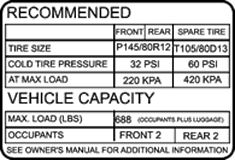Efficient Driving Tips (from www.fueleconomy.gov)
Note: Cost savings are based on an assumed fuel price of $2.79/gallon. (How ironic the government hasn't updated this site based on the real price of gas! More like $3.50 a gallon.)
Drive Sensibly
Aggressive driving (speeding, rapid acceleration and braking) wastes gas. It can lower your gas mileage by 33 percent at highway speeds and by 5 percent around town. Sensible driving is also safer for you and others, so you may save more than gas money.
| Fuel Economy Benefit: | 5-33% | |
| Equivalent Gasoline Savings: | $0.14-$0.92/gallon |
Observe the Speed Limit
 While each vehicle reaches its optimal fuel economy at a different speed (or range of speeds), gas mileage usually decreases rapidly at speeds above 60 mph.
While each vehicle reaches its optimal fuel economy at a different speed (or range of speeds), gas mileage usually decreases rapidly at speeds above 60 mph.
As a rule of thumb, you can assume that each 5 mph you drive over 60 mph is like paying an additional $0.20 per gallon for gas.
Observing the speed limit is also safer.
| Fuel Economy Benefit: | 7-23% | |
| Equivalent Gasoline Savings: | $0.20-$0.64/gallon |
Remove Excess Weight
Avoid keeping unnecessary items in your vehicle, especially heavy ones. An extra 100 pounds in your vehicle could reduce your MPG by up to 2%. The reduction is based on the percentage of extra weight relative to the vehicle's weight and affects smaller vehicles more than larger ones.
| Fuel Economy Benefit: | 1-2%/100 lbs | |
| Equivalent Gasoline Savings: | $0.03-$0.06/gallon |
Avoid Excessive Idling
Idling gets 0 miles per gallon. Cars with larger engines typically waste more gas at idle than do cars with smaller engines.
Use Cruise Control
Using cruise control on the highway helps you maintain a constant speed and, in most cases, will save gas. (Added bonus: no more speeding tickets!)
![]()
| Keep Your Engine Properly Tuned... | |||||||
Fixing a car that is noticeably out of tune or has failed an emissions test can improve its gas mileage by an average of 4 percent, though results vary based on the kind of repair and how well it is done. Fixing a serious maintenance problem, such as a faulty oxygen sensor, can improve your mileage by as much as 40 percent. | |||||||
| |||||||
| | |||||||
Check & Replace Air Filters Regularly | |||||||
Replacing a clogged air filter can improve your car's gas mileage by as much as 10 percent. Your car's air filter keeps impurities from damaging the inside of your engine. Not only will replacing a dirty air filter save gas, it will protect your engine. | |||||||
| |||||||
Keep Tires Properly Inflated (don't know how to do this? watch this video!) | |||||||
| |||||||
| |||||||
| | |||||||
Use the Recommended Grade of Motor Oil | |||||||
 You can improve your gas mileage by 1-2 percent by using the manufacturer's recommended grade of motor oil. For example, using 10W-30 motor oil in an engine designed to use 5W-30 can lower your gas mileage by 1-2 percent. Using 5W-30 in an engine designed for 5W-20 can lower your gas mileage by 1-1.5 percent. Also, look for motor oil that says "Energy Conserving" on the API performance symbol to be sure it contains friction-reducing additives. You can improve your gas mileage by 1-2 percent by using the manufacturer's recommended grade of motor oil. For example, using 10W-30 motor oil in an engine designed to use 5W-30 can lower your gas mileage by 1-2 percent. Using 5W-30 in an engine designed for 5W-20 can lower your gas mileage by 1-1.5 percent. Also, look for motor oil that says "Energy Conserving" on the API performance symbol to be sure it contains friction-reducing additives. | |||||||
| |||||||
|
Why do this stuff?
Saves You Money
You can save $200-$1,500 in fuel costs each year by choosing the most efficient vehicle that meets your needs. This can add up to thousands of dollars over a vehicle’s lifetime. Fuel-efficient models come in all shapes and sizes, so you don't have to sacrifice utility or size.
You can also increase the fuel economy of you current vehicle by adopting good driving habits and maintaining your vehicle.
Strengthens National Energy Security
 Better fuel economy can reduce our dependence on foreign oil.
Better fuel economy can reduce our dependence on foreign oil.
More than half of the gasoline we put in our cars comes from oil imported from other countries.
Petroleum imports cost us over $5.2 billion a week—that’s money that could be used to fuel our own economy.
Protects the Environment
Burning fossil fuels such as gasoline or diesel contributes to a number of environmental problems, such as air pollution (smog) and global climate change. In addition, spills from refining and transporting oil and petroleum products damage ecosystems and pollute groundwater and streams.
Conserves Resources
Almost all of the cars and trucks we drive run on fuels derived from oil. Oil is a non-renewable resource, and while there is some debate as to how long this resource will last, we will eventually have to find new ways to power highway vehicles. Until other alternatives are developed, it makes sense to use fossil resources such as oil more efficiently to buy time to develop new and better energy sources and to make the transition to these sources smoother and less expensive.
So there you have it. If you unload all that dry cleaning you have sitting in your trunk because you can't afford to take it to get cleaned and you check your tire pressure and use the correct fuel, you can drastically increase your fuel economy! And if you observe safer driving practices on the road, you will be able to have Lydia ride as a passenger in your car!




No comments:
Post a Comment